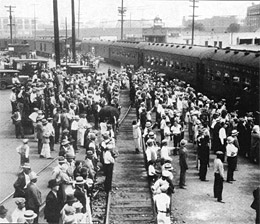 |
 |
 |
 News from Around the Americas | May 2005 News from Around the Americas | May 2005  
Amends Sought For 1930s Deportees
 Aurelio Rojas - SacBee.com Aurelio Rojas - SacBee.com


| | Mexicans being deported from L.A. in 1931. |
As a child during the early 1930s, state Sen. Nell Soto remembers trying to make sense of sweeps through her Los Angeles County neighborhood by authorities who hauled away Mexican Americans in trucks and buses.

"I will never forget experiencing the deportation of these people who looked like me," said Soto, D-Pomona, whose family was spared because of their Spanish heritage.

Between 1929 and 1940, scholars estimate the United States deported more than 1 million people - including 400,000 in California - under a Depression-era program launched by President Herbert Hoover to open up jobs for citizens.

But 60 percent of those deported under the Mexican repatriation program were born in the United States, according to a review of U.S. and Mexican records by historians Francisco Balderrama and Raymond Rodriguez.

Since reading their 1995 book, "Decade of Betrayal," state Sen. Joe Dunn, D-Santa Ana, has been on a mission to make amends for the dark episode in U.S. history.

Last week, the state Senate voted 27-5 to approve Senate Bill 670 by Dunn to formally apologize for the forced deportation.

Meanwhile, the Senate Appropriations Committee approved another bill by Dunn - Senate Bill 645 - to create a fund to pay reparations to surviving deportees who file claims.

Republican Gov. Arnold Schwarzenegger vetoed a similar bill last year, citing the potential costs of "thousands of claims against the state and local governments."

The new round of legislation is expected to clear the Democrat-controlled Legislature. The Governor's Office said Schwarzenegger will not take a position on either bill until they reach his desk.

Dunn said he does not expect the governor will sign the reparations bill, which would require separate legislation to pay for claims.

But the senator is hopeful that Schwarzenegger will sign SB 670. The governor's recent pronouncement against illegal immigration and support of volunteer Minutemen for patrolling the border have rankled Mexican officials.

"I don't see how someone could oppose a simple apology bill as a small token of justice for those who survived the deportations," Dunn said.

State Sen. Dave Cox, R-Fair Oaks, concedes the deportations were unconstitutional. But he said he voted against the apology because of legal concerns.

"Frankly, this is just a bill to open the floodgates of litigation against the state," Cox said.

In 2004, a class-action lawsuit was filed against the state on behalf of victims of the repatriation program.

The plaintiffs dropped their case after the Legislature passed a reparations bill - ultimately vetoed by Schwarzenegger - while preserving the right to bring a subsequent suit.

SB 645 would extend the statute of limitations on those suits until 2011.

But Dunn contends that because the statute of limitations has expired, "no survivor has a viable cause of action at the current time" and criticism is "not valid relating to this apology."

Christine Valenciana, an assistant professor of education at California State University, Fullerton, said an apology would serve as an important lesson to future generations.

Valenciana's mother, Emilia Castaneda, was 9 years old when she was deported to Mexico. Like many others caught in the dragnet, she had been born in the United States and spoke little Spanish.

By the time she returned to California nine years later, her education had been irrevocably interrupted. Recently, the 79-year-old Castaneda testified in support of Dunn's legislation.

"She's always said, 'I just want people to know what happened,' " Valenciana said. " 'We don't want for this to happen again.' "

In "Decade of Betrayal," Balderrama - who is married to Valenciana - and Rodriguez contend the raids along with the 1942 Sleepy Lagoon murder trial and the 1943 zoot suit riots led to the 1960s Chicano power movement.

Sen. Wes Chesbro, D-Arcata, said that his maternal grandmother was a Methodist minister at a church in East Los Angeles during the sweeps.

"My mother told of watching as members of their church, their neighbors and their childhood friends were removed from their neighborhoods," Chesbro said during the Senate debate on the apology bill.

"These were United States citizens. These were fellow Americans, who simply because of their heritage were denied their constitutional rights."

Across the country, people suspected of being of Mexican descent were stopped on streets and asked to prove their right to be in the United States.

Dunn said many native Americans who were deported were unable to return to the United States, while others were able to return because they were drafted to fight for the United States in World War II.

Critics of Dunn's legislation argue that because federal and local authorities spearheaded the sweeps, the state should not be held accountable for their roles.

But Dunn maintains "that's why we should establish a commission to complete the investigation and make recommendations if, in fact, reparations are due and, if so, how much on behalf of the state of California."

Dunn cites the Reagan administration's compensation of Japanese Americans who were held in camps during World War II. Survivors received $20,000 under the 1988 federal legislation.

Dunn estimates fewer than 5,000 victims of the Mexican repatriation program are still alive.

Valenciana said that until recently, families that were affected did not have the resources and political clout to seek redress.

Soto, who turns 79 next month, said the deportations shaped her life.

"That probably had a lot to do with my being involved in politics and trying to do something about what I think is wrong," she told her Senate colleagues. | 
 | |
 |



